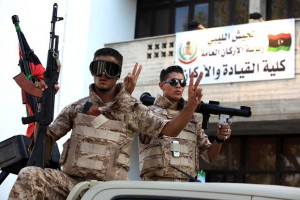As world leaders meeting at the United Nations General Assembly debate military intervention in Syria, Europe is struggling to make diplomatic progress in the other main source country for asylum-seekers and migrants: Libya.
EU officials expressed optimism this week that, despite the passing of yet another deadline for reaching a deal between warring factions in the North African country, they can still help broker a power-sharing agreement.
“Something is moving,” said one diplomat. “I believe [Russian President Vladimir] Putin’s activism in Syria is a good sign also for Libya.”
The EU has focused a lot of effort in recent months on Libya, a major gateway for migrants and refugees crossing the Mediterranean in an effort to reach Europe. The EU has been mediating talks between rival factions in Libya even as it ramps up a naval mission in the Mediterranean aimed at stopping the people-smugglers operating out of the country. An agreement is seen as crucial to the effectiveness of the operation.
“During this first part of the naval mission we have had 20 cases where we could have intervened to identify and arrest the smugglers, if we had already been allowed to act in international waters,” said an EU military commander involved in the operation.
The number of refugees and migrants crossing the Mediterranean this year has exceeded 300,000, including almost 200,000 people landing in Greece and 110,000 in Italy, according to UNHCR, the UN refugee agency. In all of 2014, 219,000 people made the same dangerous trip, which, this year, has already killed over 2,500 refugees and migrants.
At an emergency summit last week, EU leaders agreed to strengthen external border controls. But the bloc is also trying to address the root causes of the refugee crisis: the political and humanitarian situations in Syria and Libya.
Libya has been torn between two capitals after the Western military intervention in 2011 that toppled the regime of Muammar Qadhafi: Tripoli, in the west, and the internationally recognized Tobruk, in the east.
Chaos in Libya
Negotiations between the two capitals have reached a critical stage. The UN special envoy to Libya, Bernardino León, has already set two deadlines that have been missed — one in June and one on September 21 — for reaching a deal between Tripoli and Tobruk.
Officials say León has made some progress in the talks and hopes for an agreement before the newly set deadline of October 20, when the mandate of the Tobruk assembly will expire.
The Spanish negotiator has already handed Libya’s factions a final draft of a peace deal to form a united government. The draft includes an institutional framework that Tobruk and Tripoli, the former capital now controlled by Libya Dawn, an alliance of Islamist-leaning former militias and armed factions, must decide whether to accept.
The two capitals must also agree on the appointment of an independent prime minister and two deputies, one for each capital, then the assemblies must vote on these names, EU diplomats involved in the talks said.
A debate on the situation in Libya has been penciled in for the agenda of a meeting of EU foreign affairs ministers set for October 12 in Luxembourg, two EU diplomats said.
But the optimism is not widely shared.
“There are many powerful subjects that are profiting from the actual chaos and that are opposing a deal: people-smugglers, local mobsters, terrorist groups, warlords,” said Karim Mezran, a Libya expert at Atlantic Council, a Washington-based think tank. “Rationally I am not very optimistic.”
‘Sophia’ is born
The EU is also moving forward on another front in the migration battle.
EUNAVFOR Med, the naval mission launched by the EU to fight human-traffickers in the Mediterranean, is about to move from an initial stage of intelligence-gathering into a more operational phase in which EU ships will be able to board, search, seize and divert suspected vessels in international waters.
With this new stage, which starts October 7, the operation will be renamed “Sophia” after the baby born on one of the ships involved in a rescue operation in August off the coast of Libya.
So far 22 European countries have been taking part in the mission which, according to EU military sources, has involved four ships (two German vessels, one Italian and one English).
“But we don’t know yet how many ships will be deployed in this second phase and whether all the initial 22 countries will take part,” said an EU military source.
The four ships involved have so far stopped 15 people-smugglers, who have been arrested by Italian authorities. The operation has saved more than 2,000 lives, said EU foreign policy chief Federica Mogherini.
But the next phase of the operation, which has not been approved yet, would also involve actions in Libyan waters and ports, meaning the Sophia operation needs a UN green light or an invitation from a new united Libyan government, if and when it can be formed.



